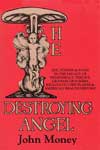
The Destroying Angel: Sex, Fitness & Food in the Legacy of Degeneracy Theory, Graham Crackers, Kellogg's Corn Flakes & American Health History. John Money
I have to admit that I was attracted to The Destroying Angel initially because I thought it was a history of the health food movement in the U.S. I had just read The Road to Wellville by T. C. Boyle and was interested in determining the accuracy of this fictional treatment of Dr. John Harvey Kellogg. So I was a bit surprised to discover that this is a book on the history of what the author, a sexologist, calls Degeneracy Theory. Now I feel like I need to read some more history to verify the facts of this book.
Anyway, I found out that Dr. Kellogg was accurately portrayed in The Road to Wellville. Congratulations Mr. Boyle for a job well done! However, while there is a very good treatment on the history of the health food movement in this book, it appears that the founders and major thinkers of this movement also had strong beliefs about sexuality. So while one third of this book is about corn flakes, whole grains and vegetarians, the rest of it is an outline of two pre-20th century mistaken theories on sexuality.
The first of these is that masturbation causes disease. According to the author this came about because, before the germ theory, people felt that the symptoms of syphilis and other sexually contracted diseases, could be traced to "self-abuse" rather than contagious transmission. The second sexual theory treated historically in the book is that sexual excitement and the corresponding sexual release are injurious to the human body and should be avoided as much as possible. The combination of these two is what John Money calls Degeneracy Theory, and he claims that their effects inhibit a sexually healthy society to this day.
In an Epilogue called Theory Of Sex, Love, And Health Without Degeneracy, which is the longest chapter in the book, Money provides a wonderfully concise outline of Sexology as it was understood twenty years ago. Thus, while nothing he says is out of date, you will not findrecent topics such as Viagra-like drugs mentioned.
This was an important book for me. I have never seen the history of sexuality theory so well portrayed. John Money is at his weakest when, towards the end of the book, he relies on technical terminology which may discourage a general readership that is most in need of this information.
No comments:
Post a Comment